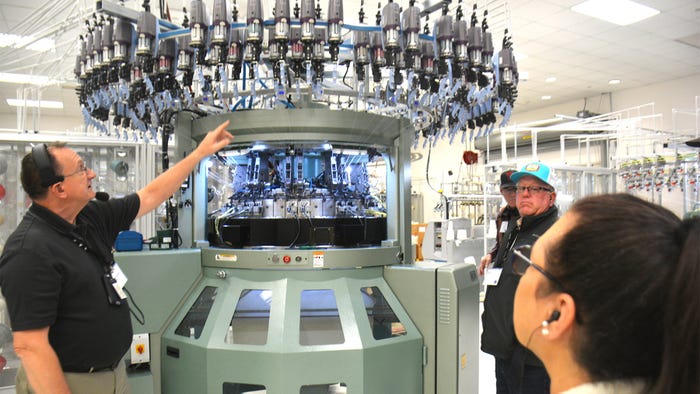
Bud Adams, supervisor of knitting operations at Cotton Incorporated, explains how the Monarch Sec-Mini single knit machine is used to knit yarn into fabric. John Hart
Cotton is a natural fiber but not a natural choice for the textile trade, leaving a daunting challenge for using more bales of cotton to make clothes, sheets, towels and a multitude of other products. The good news is that consumers prefer cotton over synthetic fibers, and cotton has a more successful sustainability story to tell.
Synthetic fibers such as polyester and rayon are uniform and can be reengineered to make virtually any textile product to order, while as a natural fiber, cotton has varying degrees of quality and fiber length, even in a good year. Polyester fibers are also uniform in length and strength. But consumers still prefer the natural comfort of cotton over polyester.
On March 18, more than 100 cotton farmers, cotton ginners, and allied industry people from nearly every cotton producing state saw first-hand the “house that cotton built,” the world headquarters of Cotton Incorporated in Cary, N.C. The Cary facility is a textile mill in miniature where a bale of cotton comes through the door and ends up as a textile product. The facility is designed to help textile mills and manufacturers use more cotton in their products.
At the “young guns tour,” sponsored by the Cotton Board, young people in the cotton industry from Alabama, Arkansas, California, Georgia, Kansas, Louisiana, Mississippi, North Carolina, South Carolina, Texas, and Virginia learned about each step of the textile process, discovering what happens to the cotton they produce after it leaves the gin.
Since 1970, Cotton Incorporated has successfully used research and promotion to build markets and demand for cotton products. Cotton Incorporated was launched because synthetic fibers threatened to put cotton out of business. Leaders in the cotton industry wouldn’t allow it, so Cotton Incorporated was born.
Through Cotton Incorporated, cotton became the first commodity to market directly to the consumer. The icon for this outreach was the Seal of Cotton trademark, a logo indicating that the product contains cotton. Since its introduction in 1973, the Seal of Cotton has been used on a variety of cotton-containing and cotton-related products, from apparel and beauty products to laundry detergent.
The Seal of Cotton is key in marketing cotton to consumers through advertising, public relations, social media, and fashion merchandising to ensure more cotton products can be found at the retail counters.
Cotton Incorporated is funded by cotton farmers and importers of Upland-cotton containing products. Cotton produced in the United States is assessed at a rate of $1.00 per bale, plus a supplemental assessment equal to 5/10 of 1% of the current value of cotton. The 2024 budget totals $89 million. Cotton Incorporated has a full-time staff of 153 people, who are subject matter experts in a wide range of fields.
Experts at Cotton Incorporated work to develop cotton products that can compete head on with synthetic fibers when it comes to strength and durability. They develop methods to make it easier for textile mills to spin cotton fibers and make cotton products.
For example, Cotton Incorporated established its Engineered Fiber Selection or EFS program 40 years ago in 1984. EFS is recognized as the premier logistics tool in global cotton markets to simplify the spinning and management of cotton fiber.
In addition to conducting research that helps ensure mills and manufacturers continue to use cotton, Cotton Incorporated conducts agricultural research to help make cotton farmers improve their productivity. In every step, Cotton Incorporated tells cottons’ sustainability success story.
About the Author(s)
You May Also Like






